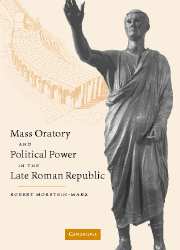Book contents
- Front Matter
- Contents
- List of figures and maps
- Acknowledgments
- Note on translations
- List of abbreviations
- 1 Introduction
- 2 Setting the stage
- 3 Civic knowledge
- 4 The Voice of the People
- 5 Debate
- 6 Contional ideology: the invisible “optimate”
- 7 Contional ideology: the political drama
- 8 Conclusion
- References
- Index
6 - Contional ideology: the invisible “optimate”
Published online by Cambridge University Press: 22 September 2009
- Front Matter
- Contents
- List of figures and maps
- Acknowledgments
- Note on translations
- List of abbreviations
- 1 Introduction
- 2 Setting the stage
- 3 Civic knowledge
- 4 The Voice of the People
- 5 Debate
- 6 Contional ideology: the invisible “optimate”
- 7 Contional ideology: the political drama
- 8 Conclusion
- References
- Index
Summary
Our chief contemporary witnesses to the political life of the late Republic, Cicero and Sallust, are fond of analyzing the political struggles of the period in terms of a distinction between optimates and populares, often appearing with slight variations in terminology, such as Senate, nobility, or boni versus People or plebs. But what precisely is denoted and connoted by this polarity? Clear enough, one who is designated in these sources as popularis was at least at that moment acting as “the People's man,” that is, a politician – for all practical purposes, a senator – advocating the rights and privileges of the People, implicitly in opposition to the leadership of the Senate; an “optimate” (optimas), by contrast, was one upholding the special custodial and leadership role of the Senate, implicitly against the efforts of some popularis or other. The polarity obviously corresponds with the dual sources of institutional power in the Republic – Senate and People – and was realized in practice through contrasting political methods (i.e., striving to keep real decision-making power within the Senate, or, alternatively, using popular organs such as the contio and comitia to shake, or overrule, a senatorial consensus) and distinctive types of rhetorico-ideological appeals suited to tapping those alternative sources of power (i.e., the “optimate” construction of the populist “demagogue,” on one side, or the “popular” politician's concitatio invidiae on the other).
- Type
- Chapter
- Information
- Mass Oratory and Political Power in the Late Roman Republic , pp. 204 - 240Publisher: Cambridge University PressPrint publication year: 2004



